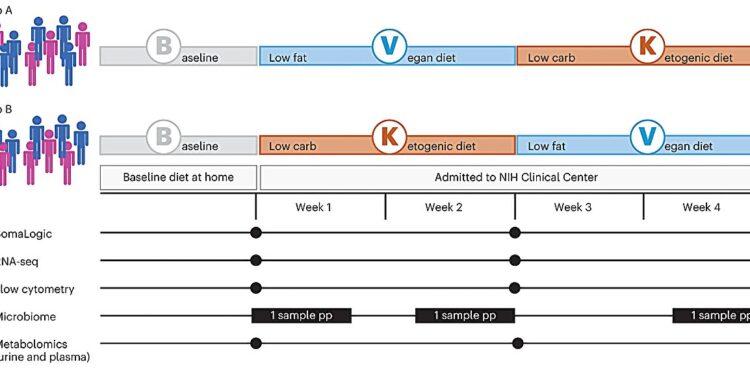Schematic of the experimental setup. Twenty participants were divided into two groups (first group: 4 women (pink), 6 men (blue); second group: 5 women, 5 men), with one group starting a vegan diet for 2 weeks and then immediately switching to the ketogenic diet . (Group A), while the other group started with a ketogenic diet and switched to a vegan diet (Group B). Data (shown at the bottom) were collected directly before the first diet as a baseline, and at the end of the first and second diets. Credit: Natural medicine (2024). DOI: 10.1038/s41591-023-02761-2
Researchers at the National Institutes of Health observed rapid and distinct immune system changes in a small study of people who switched to a vegan or ketogenic (also called keto) diet. Scientists closely monitored various biological responses of people following vegan and keto diets for two weeks, in random order.
They found that the vegan diet caused responses linked to innate immunity – the body’s first line of non-specific defense against pathogens – while the keto diet caused responses associated with adaptive immunity – an immunity specific to pathogens constructed by exposures in daily life and vaccination.
The work is published in the journal Natural medicine.
Metabolic changes and changes in participants’ microbiomes (communities of bacteria living in the gut) were also observed. Further research is needed to determine whether these changes are beneficial or harmful and what effect they might have on nutritional interventions for diseases such as cancer or inflammatory diseases.
Scientific understanding of the impact of different diets on the human immune system and microbiome is limited. Therapeutic nutritional interventions, which involve changing diet to improve health, are not well understood, and few studies have directly compared the effects of multiple diets. The keto diet is a diet low in carbohydrates and generally high in fat. The vegan diet eliminates animal products and tends to be high in fiber and low in fat.
The study was conducted by researchers at NIH’s National Institute of Allergy and Infectious Diseases (NIAID) and the National Institute of Diabetes and Digestive and Kidney Diseases (NIDDK) at the Metabolic Clinical Research Unit from the NIH Clinical Center. The 20 participants were diverse in ethnicity, race, gender, body mass index (BMI), and age.
Each person ate as much as they wanted from one diet (vegan or keto) for two weeks, followed as much as they wanted from the other diet for two weeks. People on a vegan diet, which was about 10% fat and 75% carbs, chose to consume fewer calories than those on a keto diet, which was about 76% fat and 10% carbs.
Throughout the study period, blood, urine, and stool were collected for analysis. The effects of the diets were examined using a “multi-omics” approach that analyzed multiple data sets to assess the body’s biochemical, cellular, metabolic and immune responses, as well as changes in the microbiome. Participants remained on site for the entire month of the study, allowing careful control of dietary interventions.
Switching exclusively to the study diets resulted in noticeable changes in all participants. The vegan diet had a significant impact on pathways related to the innate immune system, including antiviral responses. On the other hand, the keto diet led to a significant increase in biochemical and cellular processes related to adaptive immunity, such as T- and B-cell-associated pathways.
The keto diet affects more proteins in the blood plasma than the vegan diet, as well as proteins from a wider range of tissues, such as the blood, brain, and bone marrow. The vegan diet promoted more red blood cell-related pathways, including those involved in heme metabolism, which could be due to the higher iron content of this diet.
Additionally, both diets produced changes in participants’ microbiomes, causing changes in the abundance of gut bacterial species that were previously linked to the diets. The keto diet was associated with changes in amino acid metabolism – an increase in human metabolic pathways for the production and breakdown of amino acids and a reduction in microbial pathways for these processes – which could reflect the higher amounts of protein consumed by people following this diet. .
The distinct changes in metabolism and immune system caused by the two diets were observed despite the diversity of participants, showing that dietary changes systematically affect widespread and interconnected pathways in the body. Additional studies are needed to examine how these nutritional interventions affect specific components of the immune system.
According to the authors, the results of this study demonstrate that the immune system responds surprisingly quickly to nutritional interventions. The authors suggest that it may be possible to adapt diets to prevent disease or complement treatments for disease, for example by slowing processes associated with cancer or neurodegenerative disorders.
More information:
Verena M. Link et al, Differential peripheral immune signatures induced by vegan and ketogenic diets in humans, Natural medicine (2024). DOI: 10.1038/s41591-023-02761-2
Provided by NIH/National Institute of Allergy and Infectious Diseases
Quote: Switching to a vegan or ketogenic diet has a rapid impact on the immune system, according to a study (January 30, 2024) retrieved January 31, 2024 from
This document is subject to copyright. Except for fair use for private study or research purposes, no part may be reproduced without written permission. The content is provided for information only.



